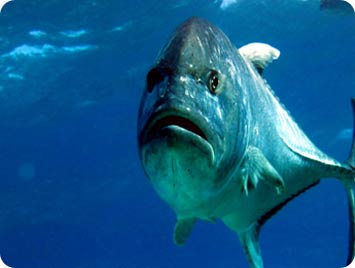The guy who came up with the expression “drinking like a fish” knew what he was talking about. Although it sounds a little kooky, saltwater fish have to guzzle saltwater to help them survive in a saltwater environment.
A fish has to maintain the proper amount of sodium, chloride, and other dissolved minerals -- the “salt” in saltwater -- in its tissues.
 Saltwater fish must take in water to help them survive. Credit: National Oceanic & Atmospheric Administration
Saltwater fish must take in water to help them survive. Credit: National Oceanic & Atmospheric AdministrationBut the water around the fish doesn’t want to cooperate. It tries to even out the distribution of freshwater and saltwater by passing through a fish’s skin and gills.
For a freshwater fish, water enters the body, so there’s no need for the fish to drink. In fact, it’s just the opposite: the fish has to urinate often and in copious amounts to get rid of the water and keep it from puffing up like a balloon -- up to a third of its body weight every day.
But a bony saltwater fish -- like tuna, cod, or halibut -- urinates very little. Instead, it must take in water. Its body fluids contain a lower concentration of salts than the water around it, so the fluids pass outward through the skin and gills. To make up for the loss, the fish must drink a lot of water -- up to about a quarter of its body weight per day. To take in a comparable amount of water, a 150-pound person would have to drink more than 80 glasses a day.
By taking in so much water, the fish also takes in a lot of salt. Special glands in its gills pump that excess salt back out.
So for a fish, “drinking like a fish” isn’t a bad thing -- it’s a matter of survival.

